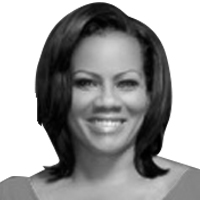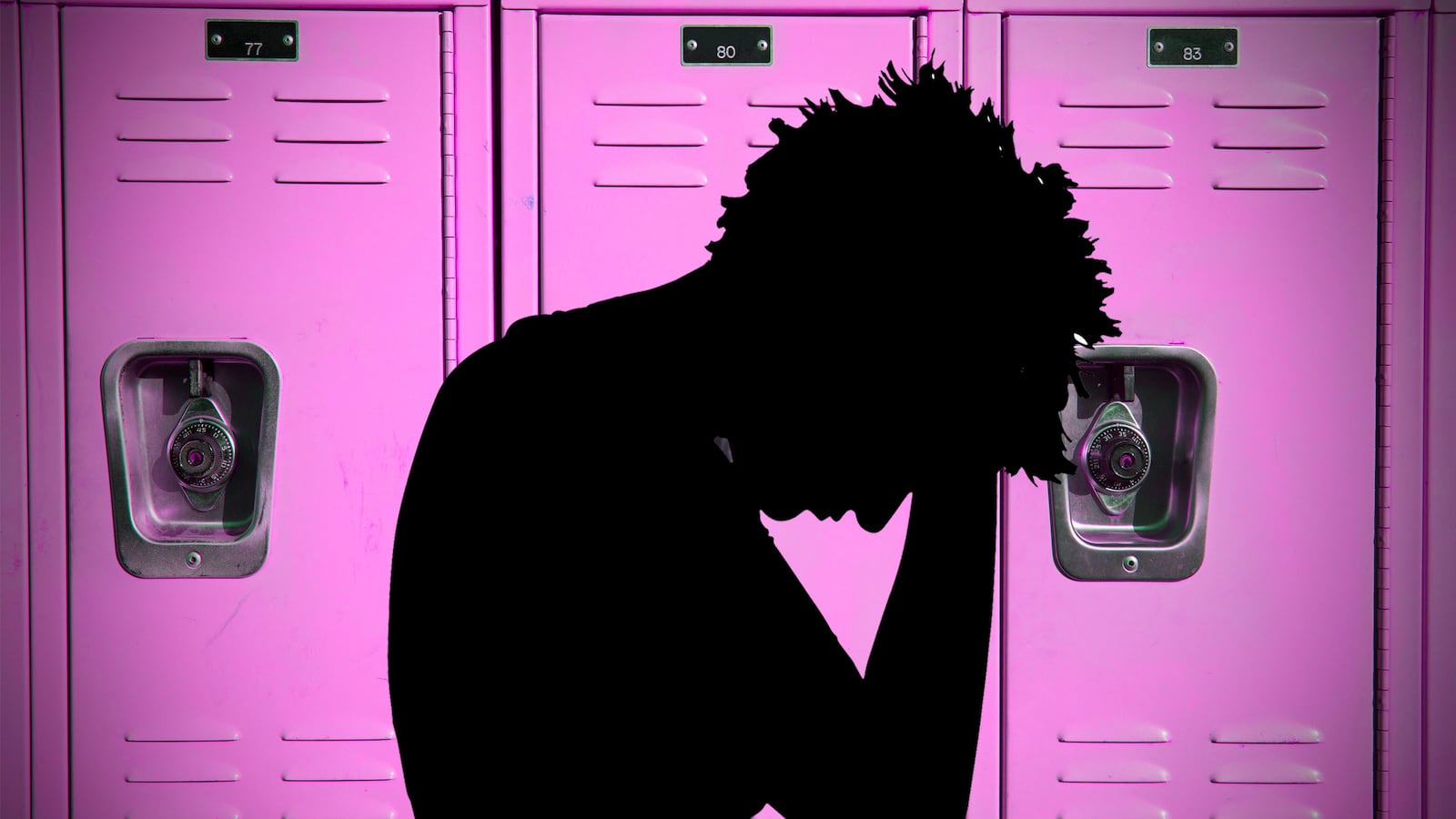It was 32 years ago, last week, that I was pulled from a dimly lit hallway into a darkened high school science lab.
I did not yell, I did not scream as he pressed me against the wall and forced his tongue into my mouth. He hiked up my cheerleading skirt, dug his fingers under the elastic of my green nylon brief trunks and pressed them inside me. He then loosened the drawstring on his athletic shorts and spun me around.
I broke away and ran.
I jetted out of the empty building and across the campus, found my car in the student parking lot and sped away. By the time I hit the first traffic light, I was crying inconsolably. I could not breathe, my face flooded with tears. I drove to Greenwood Cemetery, less than a mile from Normandy High School and sat next to my father’s grave. There, I continued to weep and struggled to pray.
It was 1984. I was 16, an outgoing high school junior, and highly decorated speech and debate-team captain. I had dreams of becoming a newscaster back then, like my idol Robin Smith, who anchored the nightly news on a local station.
My rapist was an assistant football coach, nearly twice my age. I am 48 years old now, the mother of grown children and young grandchildren, but—as far and wide as I have traveled in this life—I will never forget what he did to me, what he stole from me.
For nearly three decades, I said nothing.
It has been difficult to watch or to fathom the hypocrisy in the days since the lurid tape of Donald Trump bragging about assaulting women was released. After he denied behaving in the ways he was caught boasting about, woman after woman stepped forward to allege he’d done just that and his surrogates, who’d already written off the talk as “locker room” banter, dismissed the women, too. The same Trump supporters—men and women—who’d applauded as his campaign brought out women who said they were victimized by Bill Clinton questioned the credibility of Trump’s accusers, asking why it took them too long to come forward.
They are familiar voices, not unlike those who chided me for remaining silent when I spoke out for the first time—first on social media and later in a series of prime-time cable news segments—after the Penn State child rape scandal emerged in 2011. My personal disclosure was immediately met by a mass of angry people—on social media, during call-in talk radio shows, in the comment section of various news reports and even on the street and in airports by intemperate strangers who recognized me.
“You should be ashamed of yourself,” one man said, as we boarded a flight from Atlanta to St. Louis.
I was stunned, but not as much as I have been by Trump’s public responses to his accusers. The GOP nominee used a rally to malign one of his accusers’ physical appearance—suggesting she was too ugly to grope. He called his accusers “sick” and “horrible.”
“Yeah, I’m gonna go after you,” he said of another accuser at another public event. “Believe me, she would not be my first choice.”
Trump called the charges “phony” and said the women were doing it for fame. As proof, he pointed to the timing of the allegations. They came forward “less than a month before one of the most important elections in the history of our country,” he told the audience.
“I’ve had conversations like that with plenty of people,” his son, Donald Trump Jr., said of his father’s 2005 tape. “I think it makes him a human. I think it makes him a normal person, not a political robot.”
Robots don’t brag about sexual assault. Robots don’t rape people. Accusers are brave, at least according to Trump Senior, unless they accusing him.
It took me nearly 30 years to find the courage to speak publicly about what happened to me—to speak the name of the man who assaulted me and to begin talking about the neighbor, whose name I never knew, and older cousin who both molested me as a child. Even then—fearful of even more public humiliation and losing my career—I did not tell my story in full measure.
I never wanted to be picked apart by perfect strangers, to wonder if the women in my mother’s church would trade gossip about her baby daughter, to embarrass my children whose college classmates would surely see the news. I was deemed a “rape survivor,” a title I never wanted for myself and a community I never wanted to be a part of. Only now do I see the power in those words and count myself a willing ally to anyone—man, woman, or child—who has been sexually assaulted.
There are times, I know, when I can provide “safe harbor” for other victims, and times when I need it for myself.
Years before they talked to national news outlets, several of Trump’s accusers reportedly confided in their friends and family members. But, I never told a soul—not my family, not school administrators, or even my friends—and I never went to the police. I had done the math in my head: young black girl, celebrated white football coach in a town of largely white policemen. I wanted to put it behind me, to forget every single thing about that day. I went home, turned out the lights, crawled into bed, and wept.
I had never felt so alone.
Even when I was assaulted for a second time by the same man, numbed by the weight of my grief, I held onto that silence. Only a few weeks after the first incident, the sun was hovering over the easterly horizon when I woke up, half dressed, in the back seat of my ’74 Mustang. The doors had been locked, my gym bag and purse tossed onto the floorboard, but all I could think about was the throbbing between my legs.
There had been an impromptu parking lot party after a Friday night football game, but I remembered almost nothing about the drive to the cheap motor lodge off Lindbergh Boulevard in North St. Louis County, except waking up at one point and seeing him behind the wheel. I dozed off again, unable to stay awake.
I wanted to tell someone, anyone. But I was gripped in fear and shame. I went to school rarely after that, returning infrequently and then mostly for midterms, finals, and standardized tests. When I did attend a full day, I slept through trigonometry and American literature. The student-director of Death of a Salesman, and playing the lead role of Willy Loman, I thought I saw him seated in the dark theatre and froze.
When my mother and I were called to the principal’s office to explain my absences, I simply said, “I don’t want to be here.” The headmaster waived my suspension and I transferred to another school.
Before the incidents, I was sitting at the top of my class, with my eyes on an Ivy League college. Then, my grades tumbled and I fell into a years-long depression. Weighing less than 100 pounds, I eschewed makeup and began dressing modestly in bulky clothes. I showered sometimes five or six times a day, trying to scrub off his scent and any memory of what happened. Racked with misplaced guilt and shame, feeling fearful and powerless, I tried to make myself small and invisible—to weather this life in relative silence.
In 2011, soon after my live interviews on CNN and MSNBC, others who’d been assaulted and raped by the same man began to come forward. The messages trickled in and then became a flurry from young women I had known in high school and others I’d never met. It was marginally comforting to know that I had not been alone. I know now that there were many of us, though each of us represented one story too many. Even now, when I look back, I feel like a coward. Maybe, by speaking out then, I could’ve saved somebody.
He had done unspeakable things to me, degrading things I still cannot utter aloud. Every so often, like last night, I wake sobbing and muttering in the night. Listening to first lady Michelle Obama’s passionate rebuke of Trump, I broke down in the newsroom yesterday. I rushed home and fell into the arms of my roommate and “sister”—Lizz Winstead, a reproductive rights activist who has taught me a lot about what solidarity means. She knows this terror first-hand. She poured wine and let me sleep. The pain still feels new—like a spiritual and physical wound that refuses to heal.
A few days ago, I asked a question on Twitter: How long did it take you to speak publicly about your sexual abuse and name the perpetrator? I wasn’t prepared for the responses.
“It took me 50 years and at 70 I’m still learning how in so many ways it has impacted my life,” a woman named Terri said. Another revealed that she had been repeatedly raped by her father, a police officer, and another said she had only now disclosed what happened to her after years of silence. There were thousands of others. I was immediately reminded that my own mother did not tell us that she had been snatched off the street and raped as a young girl growing up in North St. Louis until she was in her 70s. She was 14 and all she can remember is the powder blue pantsuit she was wearing.
From the land of who-asked-you and who-gives-a-flying-fuck-what-you-think, MSNBC cable news host Joe Scarborough weighed in on the matter, saying he is “skeptical” about the allegations because, he says, if he had been a victim of sexual harassment he would have come forward sooner. He asked: “why suddenly all of this stuff is blowing up in October.”
“I’m skeptical about the timing of all of this,” he said on his show. “Talk about an October surprise. When again… there have been a thousand triggering events that would have made sense. If I had been sexually harassed by this man—the Megyn Kelly story would have given me an opportunity.”
“Stop suggesting that if a victim didn’t come forward at the time that the claim is a lie,” CNN’s Jake Tapper tweeted. “That is to not understand sexual assault.”
“I have found over my 25 years in public life that being skeptical usually pays off in the end,” Scarborough said on Morning Joe.
Pays off how and for whom? Certainly not for the women (and men) who have suffered through sexual violence. Certainly not for me.
The good news is Trump’s campaign for the presidency will not survive these latest revelations. Despite the vile, ugliness of the news cycle, despite the aspersions cast on our characters, some of us—victims of sexual assault—have and will survive.
I am one of them.





